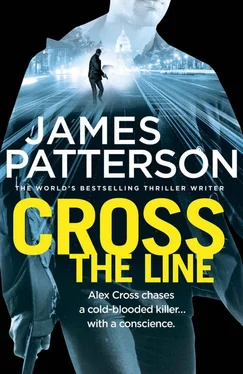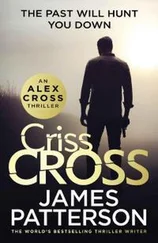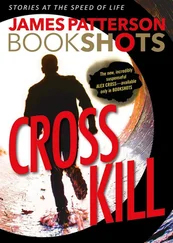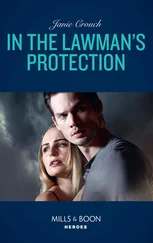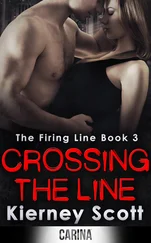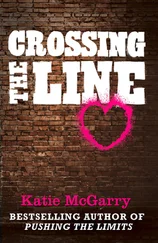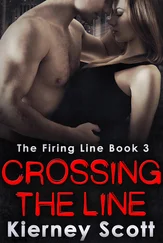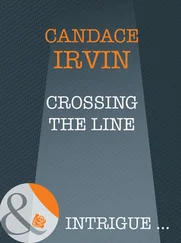“Voice mail,” Bree said.
“That’s probable cause to do a well-being check, don’t you think, Chief?”
She hesitated, and then said, “No fruit of the poisonous tree.”
Nodding, I pushed up the sash and climbed in, calling, “Terry Howard? It’s Alex Cross. We’re just checking on your well-being.”
No voice replied, but almost immediately I heard a bird squawking.
“That’s Sylvia Plath,” I said, helping Bree and Muller inside. “His neurotic parakeet.”
“Howard always had a twisted sense of humor,” Muller said.
We moved deeper into the apartment, past a dining table buried in stacks of old newspapers to the parakeet that was pacing back and forth on its perch, screeching, bobbing its head, and pecking viciously at its featherless skin, clearly agitated.
We stepped into the living area and saw why.
Terry Howard sat in his easy chair facing the television; a film of blood and gore spattered the ceiling and walls around him. He had apparently put a gun in his mouth and shot himself. A sizable chunk of his skull was gone. A bloody, red Redskins cap was on the floor beside him.
An empty bottle of Smirnoff and a Remington 1911 .45-caliber pistol, the same kind of gun that had killed Tom McGrath, lay in his old partner’s lap.
On the floor beside him, there was a note scrawled in ink.
Rot in hell, Tommy McG, it read. You and your lying bitch of a girlfriend.
“Case closed?” Sampson asked as we drove past the Wolf Trap National Park for the Performing Arts in Northern Virginia.
“Bree thinks so,” I said. “So does Michaels. Tough one to swallow, but there it is.”
“You’re not sold?”
“Just trying to understand the entire situation before we declare it a revenge killing and a suicide. Take a right.”
Sampson did, and then he made a left, and we were into big-money properties, sprawling estates, some with high walls and security gates. It was dusk and lights were blinking on.
“Coming up on your right,” I said.
Sampson slowed, put on a blinker. We drove up a narrow road maybe a hundred feet long with gardens on both sides. At the end of it was a guardhouse, a turnaround, and a steel security gate set in a high wall.
The polished brass sign on the guardhouse read THE PHOENIX CLUB. PRIVATE. MEMBERS ONLY.
We’d no sooner reached the turnaround than a big, muscular dude stepped out in a blue polo shirt with the Phoenix Club logo on the chest and a Glock pistol holstered at his waist.
He held up his hand and came to the driver-side window.
“Are you members?” he said in a thick Eastern European accent.
“No,” Sampson said, and he showed his police badge and ID. “We need to talk to someone about Edita Kravic.”
“I don’t know her,” the man said, seeming unimpressed that we were cops.
“She worked here, and now she’s dead,” Sampson said. “So go inside and call whoever would know and tell them we’re not leaving until we speak with someone about her.”
The guard stared at Sampson. Sampson glared back. Then the security guy bit his lip and went into the guardhouse.
Twenty minutes later, the gates opened and out came a golf cart driven by a bald man in a finely tailored blue suit. He stopped the cart and got out. He was in his thirties, with slightly cauliflower ears, pale blue eyes, and extraordinarily large hands with knuckles that had been broken a few times.
“I am Sergei Bogrov,” he said, taking my hand and then laying his other mitt-like hand on top of mine, swallowing it. “I help manage the club. How may I help?”
“Edita Kravic,” I said. “She worked here.”
Bogrov’s face fell and he let go of my hand. “Yes, we hear this. Very sad. She was well liked by the staff and members.”
“What did she do?”
“She taught a hybrid of yoga and Feldenkrais therapy.”
“Level Two Certified Coach?” I asked.
“That’s right,” Bogrov said. “She also worked in the spa as a masseuse. She was an excellent one.”
“Good money in that?” Sampson asked.
“If the member is a generous tipper, it can be,” he said.
“So, what is the Phoenix Club?” I asked. “Health spa and...”
“Pools, tennis courts, fitness center, an excellent private restaurant, an extensive wine cellar, the best bar in Virginia, and the company of others who have achieved much in life and deserve more,” Bogrov said.
“You sound like you’re doing a marketing pitch,” Sampson said.
Bogrov smiled. “You caught me.”
“Can we get a tour?” I asked.
“I’m afraid that’s impossible,” Bogrov said. “Our members belong to the club as much for its strict privacy as for its amenities.”
“We could get a warrant,” Sampson said.
Bogrov dropped the facade of friendliness and said, “On what basis, Detective?”
“The murder of a DC police chief and his confidential informant.”
Bogrov’s eyes narrowed. “I ask again, on what basis? Yes, I know who Edita was killed with, but where do you connect this to my club?”
“At the moment, I’m not at liberty to say.”
“This means you have nothing,” Bogrov said with a dismissive flap of a giant hand. “And since you are from the District of Columbia and not the Commonwealth of Virginia, you have no jurisdiction here. So I ask you politely but firmly to leave the property.”
I woke out of a dead sleep to find Jannie standing by the bed holding her running shoes.
Dazed, I glanced at the clock. Ten minutes to six. Then I remembered I’d told her to wake me and we’d run together. I’d been working so much I wasn’t getting in my normal workouts and had put on five pounds I didn’t need.
So I nodded and got up, leaving Bree blissfully snoozing. I dressed in the bathroom, went into the kitchen, and made a cup of instant coffee. As I sat there drinking it, I tried to muster up the will to tie my shoelaces. This wasn’t going to be a fun run. More like torture.
“Dad?”
Stifling a yawn, I looked up and saw Ali standing there, rubbing his eyes.
“What are you doing up so early, kiddo?” I asked.
“I couldn’t sleep,” he said, coming over to snuggle with me, which didn’t help my workout plans. I could have drifted off right then and there with my little boy in my arms.
But I said, “You couldn’t fall asleep? Or you couldn’t stay asleep?”
“Both,” he said. “I had too much to think about.”
“Really?” I said, closing my eyes. “Like what?”
“Time,” Ali said. “And how it, like, curves at the speed of light. Neil deGrasse Tyson said that’s what happens, so it has to be true.”
I opened my eyes, thinking how strange it was to be having this conversation with a seven-year-old. “I think Einstein figured that out.”
“I know that,” Ali said. “Which makes it doubly true, and that’s the problem, and that’s why I can’t sleep.”
“I don’t understand.”
“I can’t see it in my head — you know, time curving.”
“And that’s why you fell asleep late and woke up early?”
“Yes,” he said, snuggling deeper into my lap. “Can you explain it to me?”
I had to fight not to laugh.
“Uh, no,” I said. “Physics isn’t one of my strengths even when I’m well rested.”
“Oh,” Ali said. “I was thinking that maybe it was like when you’re dreaming and time seems like it goes on forever, but scientists studying your brain say you’re only dreaming for three to eight minutes. Does that make sense?”
That woke me up for good, and I looked down at my son and wondered what he would become. I’d told all my kids that they could be anything their hearts desired as long as they were willing to work for it. But at that moment, Ali seemed limitless.
Читать дальше
